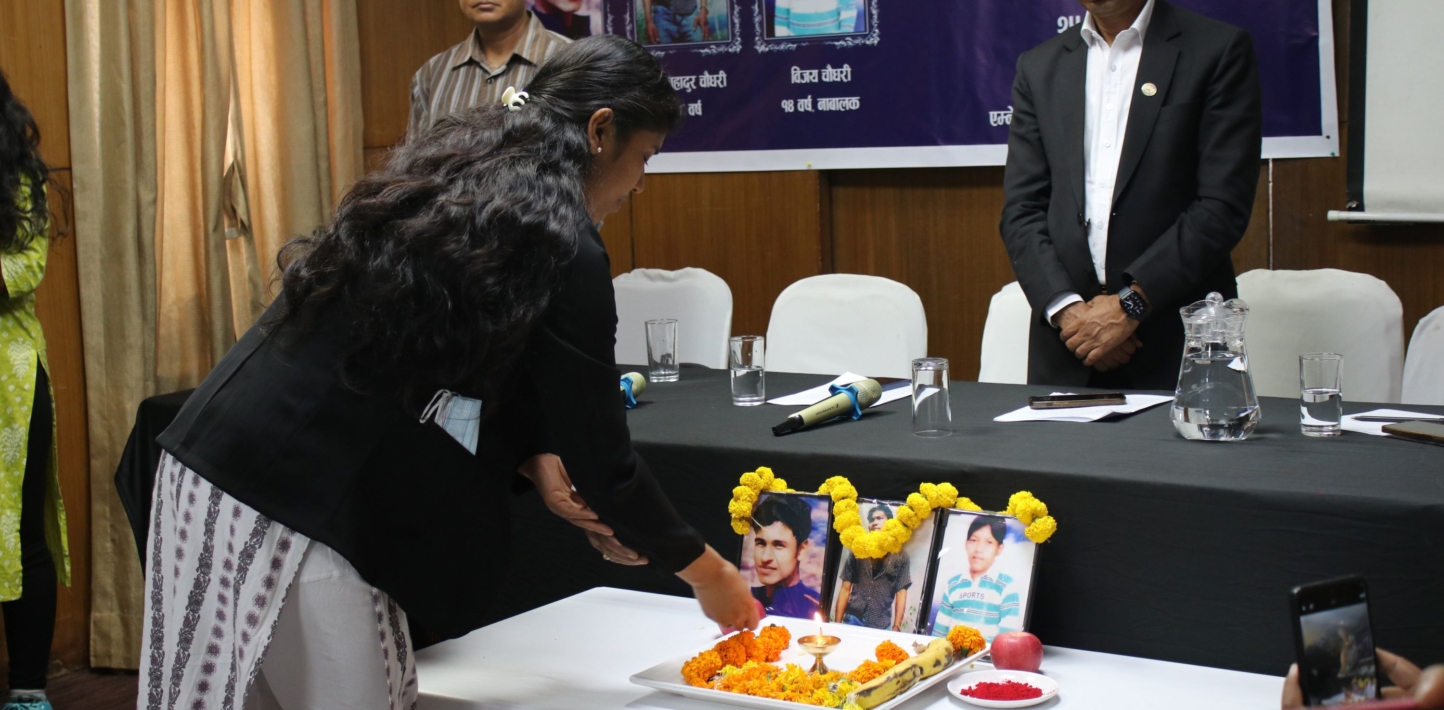On 25 Chaitra, 2061 BS (April 7, 2005), three brothers—Arjun Chaudhary (21), Indra Bahadur Chaudhary (18), and Bijaya Chaudhary (14)—were tortured and killed by the Nepal Army personnel in Dang. Twenty years have passed since that tragic day, yet their sister, Sushila Chaudhary along with their families, is still searching for answers. Why were they killed? Who killed them? And will her family ever see justice?
Sushila, now a practising lawyer, has spent the last two decades fighting for truth, accountability, and dignity. But she is not alone in this fight. The 1996–2006 armed conflict, which led to the overthrow of the monarchy and the establishment of Nepal as a federal republic, has left thousands of families across Nepal enduring similar grief. Their suffering, and the state’s failure to acknowledge it, remains a deep, unhealed wound.
To commemorate the lives of the three brothers, Dwanda Prabhavit Sarokar Kendra, Dang, with support from Amnesty International Nepal, organised a memorial event on 7 April in Kathmandu.
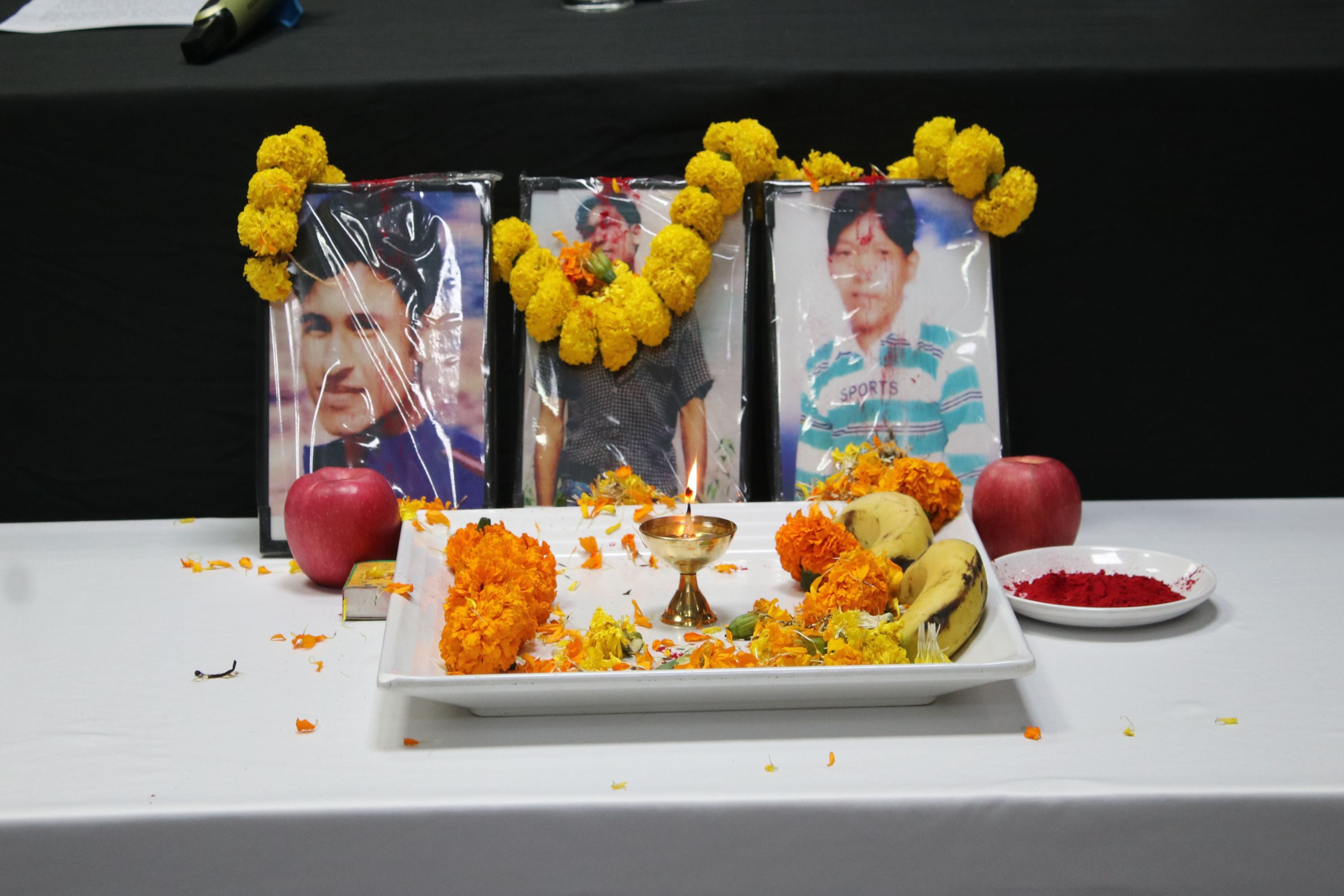
The program began with a heartfelt note by Sushila Chaudhary, the founding Secretary of Dwanda Prabhavit Sarokar Kendra, Dang. She shared her frustration with the prolonged delay in justice, saying, “It’s been 20 years since we started demanding justice. It’s been 18 years since the Comprehensive Peace Agreement was signed, yet we have received no answers from the state. For years, the transitional justice process has been sidelined. Now, with the rising political tensions, we fear that our issues will be completely forgotten. The state failed to resolve this on time—our only hope is that it won’t just fade away. We still want to know the truth. We still need to know why this happened to our families.”
This was followed by the offering of flowers and vermillion powder on the photos of the three youths to honour their memory. After the memorial, a panel of distinguished guests—including a member of parliament, secretary of the National Human Rights Commission, activists, and conflict victims—discussed the current state of the transitional justice (TJ) process in Nepal, highlighting the ongoing challenges faced by victims and their families.
Govinda Bandi, former Minister for Law, Justice and Parliamentary Affairs emphasised the need for a genuinely victim-centered approach in the transitional justice process. “Other countries have shown us the value of a victim-centered TJ process. Nepal designed its own with the same spirit. But we cannot expect justice unless we implement it sincerely and appoint credible individuals to the commissions that will lead the justice process. We must support and push for a system that prioritises truth and accountability,” he said.
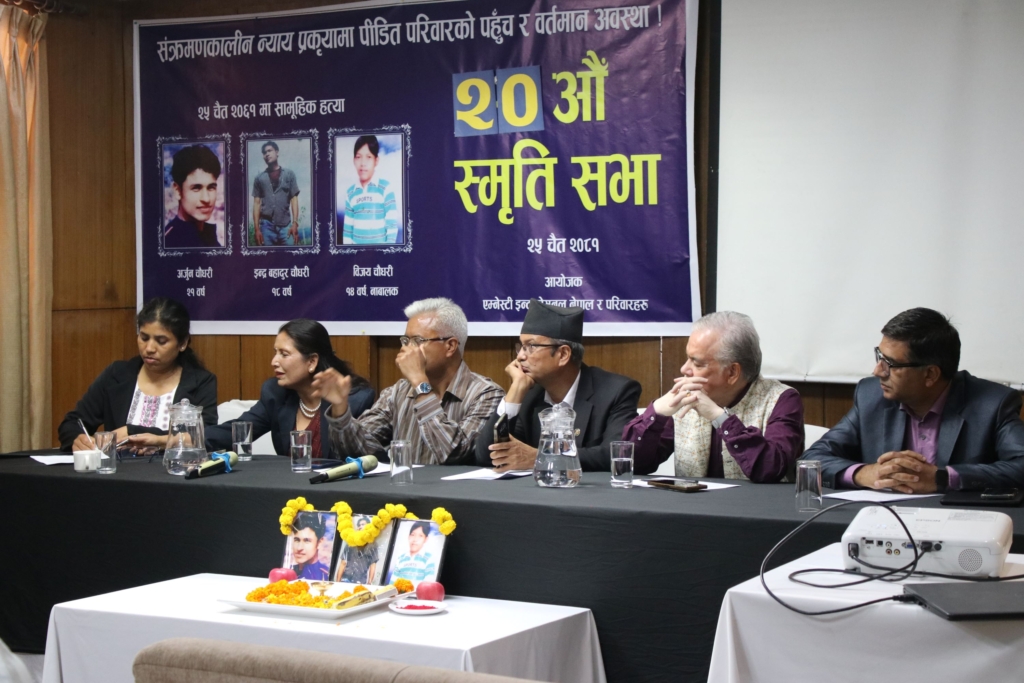
Human rights activist Sobhakar Budhathoki noted that despite 20 years having passed, the state has done little more than form commissions, pointing out that there are thousands like Sushila still waiting. “It’s unfortunate that the process hasn’t really moved beyond the surface,” he remarked.
Dr. Tika Dhakal, a transitional justice expert, stressed the importance of learning from past mistakes and holding on to hope. “The road to justice has been paved with missteps, but we must hope that the new committee being formed can do better,” he said.
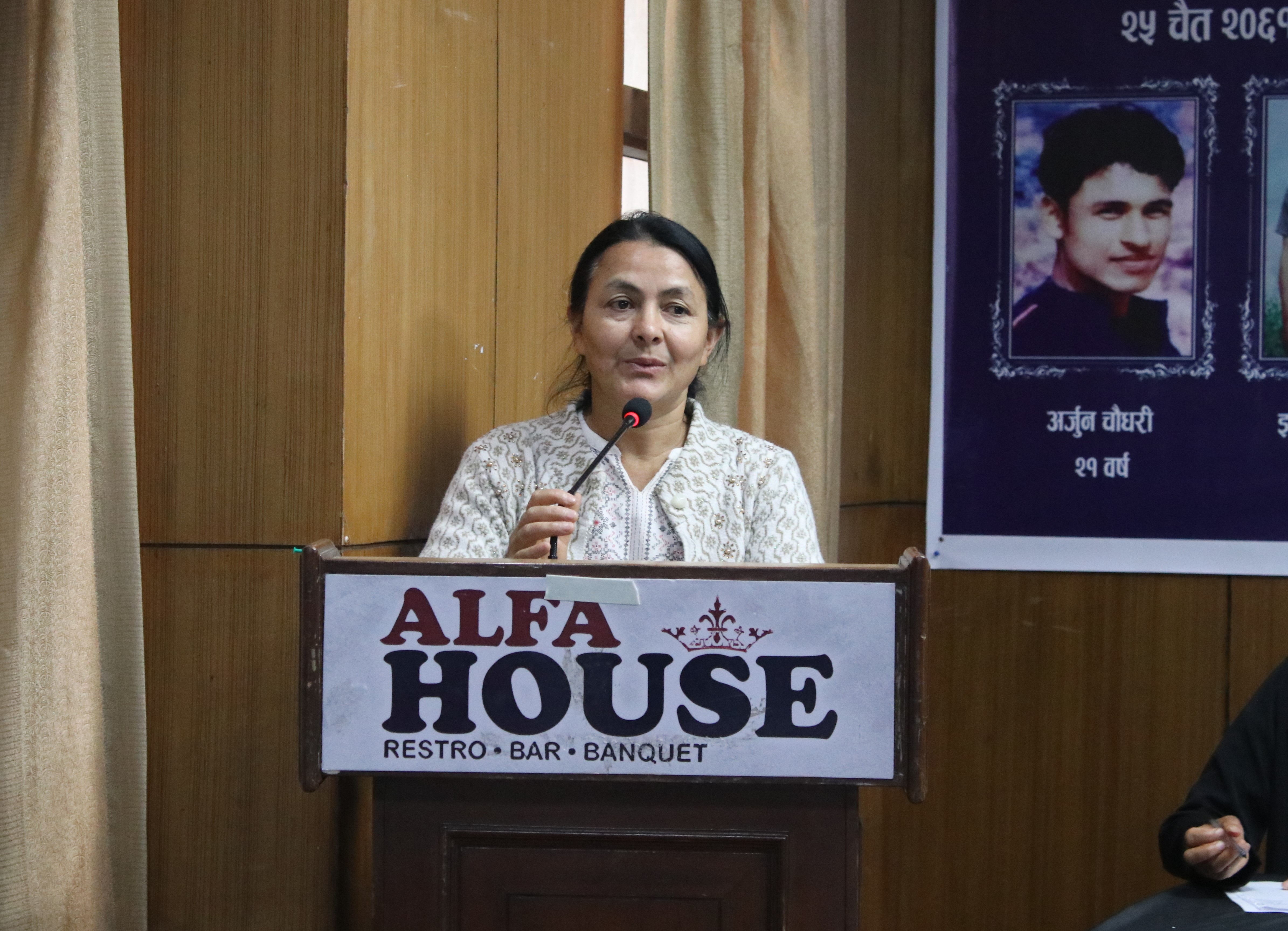
Devi Khadka, a former Maoist Army member, former parliamentarian, and survivor of conflict-related sexual violence, shared a powerful reflection: “Sadly, in many situations, truths are relative, and timing is everything. This delay in the transitional justice process has caused irreversible harm. For victims of the war, hoping for too much for too long has become a burden in itself. But even now, those of us who have survived must find peace, somehow.”
Charan Prasai, a prominent human rights defender and former Chairperson of Amnesty International Nepal, echoed her sentiments: “There’s a deep sense of disappointment in the air, and rightly so. We talk about the TJ process being victim-centric, but the truth is victims have little to no access to the system. Victims like former child soldiers and survivors of sexual violence are not even recognised by the state. Without inclusion, justice remains hollow.”
Amnesty International Nepal’s Chair Bipin Budhathoki pointed out at the broken promises made by political leaders: “They promised the process would be completed in 60 days, but two decades have passed with no sign of any justice. Politicians only raise the issue of transitional justice when it suits them. Yet, we must continue to raise our voices. I also want to take this moment to emphasize the importance of memorialization. It is crucial not only to remember those lost but to prevent future injustices. We must ensure that the lived histories of thousands of people do not get erased.”
Murari Kharel, Secretary of the National Human Rights Commission, remarked that transitional justice has been used as a political tool. “It is extremely unfortunate how politicians have politicised what is fundamentally a human rights issue. Still, if we appoint committed, trustworthy individuals, there’s hope. A transparent process is key,” he said.
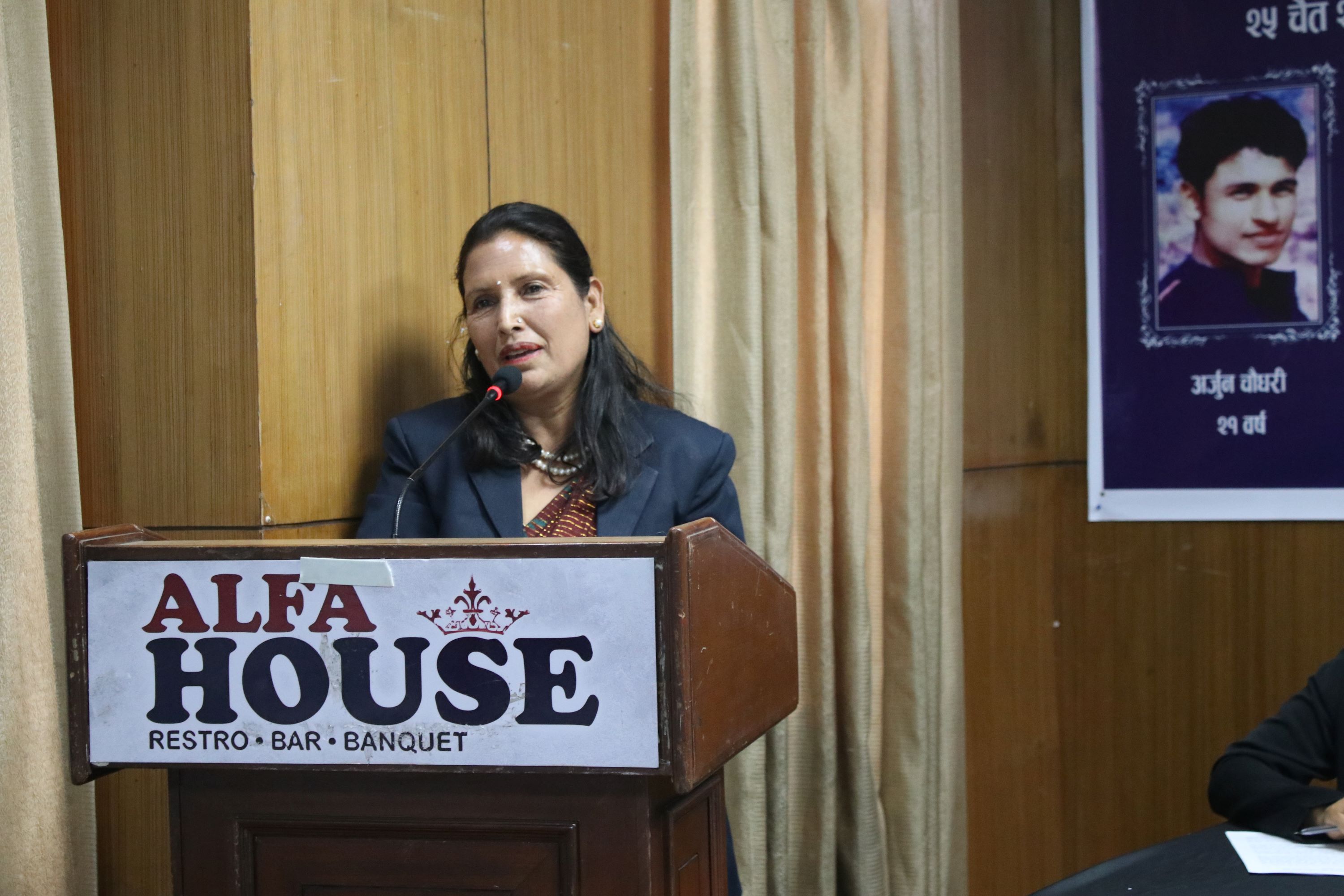
Maina Karki, Member of Parliament and herself a victim of the conflict whose husband was murdered, shared, “A new recommendation committee has been formed, and it is now our duty to stay vigilant and hold this committee accountable. We must ensure that only those whose interests lie in making this transitional justice process just are appointed to the Truth and Reconciliation Commission (TRC) and the Commission for the Investigation on Enforced Disappeared Persons (CIEDP), which will hopefully drive this process forward. For parents who still believe their children will return one day, we must keep fighting. It is heartbreaking that each year we gather only to remember, without answers.”
Sushila concluded the program by reflecting on the importance of remembrance: “To remember is to gather courage. I am deeply grateful to everyone who stood with us today. It reminds me that we are still here, still demanding justice.”


